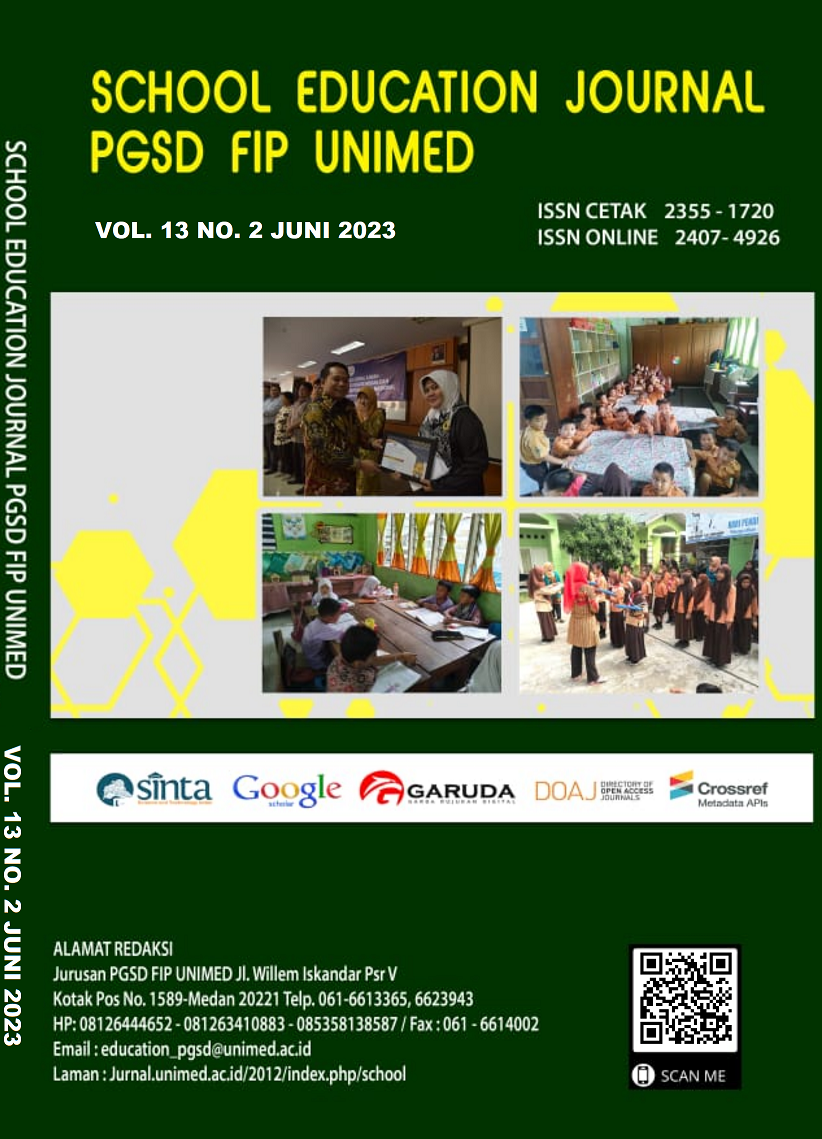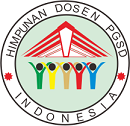ANALISIS OBSERVASI HASIL BELAJAR SISWA SD KELAS III DAN KELAS V PADA MATA PELAJARAN MATEMATIKA DI KOTA MEDAN, KABUPATEN DELI SERDANG DAN KABUPATEN LANGKAT
DOI:
https://doi.org/10.24114/sejpgsd.v13i2.46216Keywords:
Observation, Learning Outcomes, Elemnentary Mathematics.Abstract
This study uses a qualitative descriptive method that aims to understand the phenomena of elementary mathematics learning outcomes. The resulting data is presented in the form of numbers described in the description. Research using the observation method was conducted on mathematics learning outcomes in grades III and grade V of elementary schools spread across three districts/cities in North Sumatra Province. To understand students' errors and misconceptions is essential for the effective teaching and learning of mathematics. It is important for teachers to approach student mistakes in a constructive way, helping students understand their mistakes and learn from them. Research has been conducted to investigate patterns of student misunderstandings, errors, and misunderstandings across educational systems, grade levels, gender, and time. Several case studies of mathematics subjects in elementary schools in North Sumatra Province became the main focus of the North Sumatra Education Office so that they held improvement and development activities for Chemistry, Biology, Physics and Mathematics subjects in 2022. The conclusion showed that only three grades III fulfilled and 1 class V that meets above the value of 70.References
Cornue, Julia W. 2018. Exploring Dyscalculia and Its Effects on Math Students. Master's thesis, Harvard Extension School. http://nrs.harvard.edu/urn-3:HUL.InstRepos:42004020
Department of Basic Education South Africa. 2018. Mathematics Teaching and Learning Framework“introducing a balanced and multi-dimensional approach for the teaching of Mathematics in South Africa. https://www.bridge.org.za/wp-content/uploads/2018/11/MatHEMATICS-TEACHING-and-LEARNING-FRAMEWORK-draft-6.pdf
Dessolina. 2020. Peningkatan hasil belajar siswa melalui metode observasi media kemasan makanan pada materi zat aditif di kelas VIII C SMP Negeri 15 Tangerang. Journal of Instructional Development Research, 1 (2): 53-58.
Hogue, M. D., & Scarcelli, D. 2020. Mathematical Misconceptions: Exploring the Teaching and Learning of Tangent Lines. Ohio Journal of School Mathematics, 86(1). Retrieved from https://library.osu.edu/ojs/index.php/OJSM/article/view/7708
Imam Suyitno, Mustofa Kamal, Sunoto, dan Indra Suherjanto. 2016. Teknik Pembelajaran Observasi Lingkungan Berbasis Kearifan Lokal. JURNAL KEPENDIDIKAN, Volume 46, Nomor 1, Mei 2016, Halaman 14-28.
Jamaludin, N. H., & Maat, S. M. 2020. A Systematic Literature Review on Students Misconceptions in Mathematics. International Journal of Academic Research in Business and Social Sciences, 10(6), 127“145. http://dx.doi.org/10.6007/IJARBSS/v10-i6/7273.
Klerlein & Hervey. 2019. Mathematics as a Complex Problem-Solving Activity: Promoting students™ thinking through problem-solving. Generation Ready. https://www.generationready.com/white-papers/mathematics-as-a-complex-problem-solving-activity/
Makonye, J. P., & Fakude, J. 2016. A Study of Errors and Misconceptions in the Learning of Addition and Subtraction of Directed Numbers in Grade 8. SAGE Open, 6(4), 215824401667137. https://doi.org/10.1177/2158244016671375.
Muhammad Rijal Fadli. 2021. Memahami desain metode penelitian kualitatif. Humanika, Kajian Ilmiah Mata Kuliah Umum, ISSN: 1412-1271 (p); 2579-4248 (e). Vol. 21. No. 1. pp. 33-54. 38075. https://doi.org/10.21831/hum.v21i1.
Neidorf, T., Arora, A., Erberber, E., Tsokodayi, Y., & Mai, T. 2020. Student Misconceptions and Errors in Physics and Mathematics. IEA Research for Education. https://doi.org/10.1007/978-3-030-30188-0.
Özdemir Baki, G., Özkaya, M., & Konyalioğlu, A. C. 2022. Teachers' approaches to student errors in mathematics teaching and noticing of their approaches. Acta Didactica Napocensia, 15(2), 209-229, https://doi.org/10.24193/adn.15.2.14.
Prasetyo, T., Yufiarti., & Rasmitadila. 2022. Menggunakan teknik observasi untuk memahami karaktersitik siswa di sekolah dasar. Pedagogi: Jurnal Penelitian Pendidikan, 9 (1), hlm. 26 - 36. https://doi.org/10.25134/pedagogi.v9i1.5015.
Rakes, C.R. & Ronau, R.N. 2019. Rethinking mathematics misconceptions: Using knowledge structures to explain systematic errors within and across content domains. International Journal of Education in Mathematics, Science and Technology (IJEMST), 5(1), 1-21.
Roselizawati Hj Sarwadi, H., & Shahrill, M. 2014. Understanding Students™ Mathematical Errors and Misconceptions: The Case of Year 11 Repeating Students. Mathematics Education Trends and Research, 1“10. https://doi.org/10.5899/2014/metr-00051.
Published
Issue
Section
License
Authors whose manuscripts are approved are approved as follows:
- The publication rights for all journal manuscript materials published/published on the SEJ (School Education Journal) E-Journal site are held by the editorial board with the author's knowledge (moral rights remain with the manuscript authors).
- The formal legal requirements for accessing this electronic digital journal article are subject to the terms of the Creative Commons Attribution-ShareAlike (CC BY-SA 4.0) license, which means that E-Journal SEJ (School Education Journal) has the right to store, transfer media/format, manage in the form of a database, maintain, and publish articles without asking permission from the author as long as the author's name remains as the copyright owner.
- Manuscripts published/published electronically are open access for educational, research, and library purposes.










